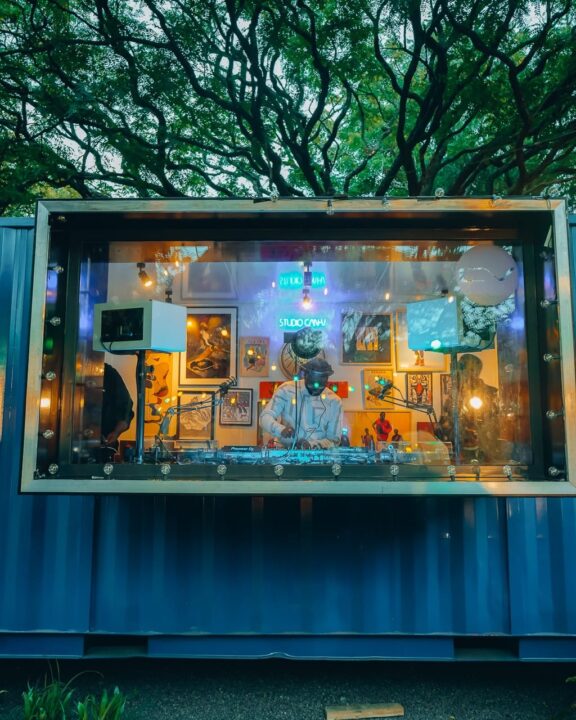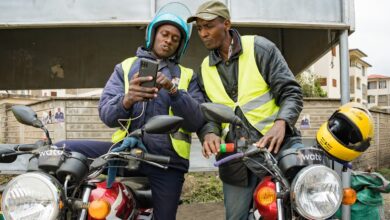A new project in Nairobi is transforming discarded shipping containers into state-of-the-art music studios, creating a powerful intersection of sustainable design, music technology, and community empowerment. Studio Can-V, founded by DJ and architect Jesse Mwenda, is offering a blueprint for how upcycled tech can solve real-world challenges for creatives.
The first portable music hub officially launched on July 2, 2025, at the Kuona Artists Collective, showcasing a fully equipped creative space for Kenya’s next generation of DJs and music producers.
The Tech Behind the Turn-Up
At its core, Studio Can-V is an innovative tech solution addressing a critical resource gap. Many aspiring DJs and producers in Kenya lack access to professional equipment, which can be prohibitively expensive. This project provides a practical, community-focused alternative.
Sustainable and Modular Design
The studio’s foundation is a recycled shipping container, a prime example of sustainable or green technology. This approach not only reduces waste but also provides a modular and portable structure. Key features include:
- Upcycled Materials: The core structure is a once-derelict container, given new life.
- Modular Build: The design allows for easy replication and deployment in different locations. Studio Can-V plans to launch a second unit later this year focused on music production.
- Off-Grid Capabilities: The project is designed to be self-sufficient, a crucial factor for sustainable operations.
A Hub for Music Technology
Inside, the container is a playground of modern music technology. It is fitted with professional-grade equipment that artists can use for free.
- Performance Gear: The studio includes turntables and mixers for practice and performance.
- Content Creation Tech: Streaming cameras are installed to broadcast live sets, helping artists reach a global audience.
- Audio Engineering: Full acoustic treatment ensures high-quality sound for both rehearsals and recordings.
By night, the space transforms into a showcase venue. These sessions are streamed and archived on platforms like YouTube, creating a living digital library of Kenyan DJ talent for global discovery.

The Visionary: Jesse Mwenda
The project is the brainchild of Jesse Mwenda, who merges his passions for architecture, music, and sustainable design. A DJ himself since the age of 14, Mwenda experienced the struggle of accessing equipment firsthand.
“Back then I had to borrow gear and sneak into a friend’s house to practice,” Jesse shared at the launch. “Studio Can-V is my answer to that struggle: a space where anyone, regardless of background, can learn, rehearse and share their sound with the world.”
His background as a Royal Institute of British Architects (RIBA) Part 1 architect was instrumental in designing the functional and sustainable aspects of the studio.
Global Backing for a Local Initiative
In 2023, Mwenda’s concept won a significant €50,000 grant (approximately KES 7.25 million) from Jägermeister’s global Save the Night Fund. The initiative, which launched in 2020, funds projects that make nightlife safer, more inclusive, and sustainable. Studio Can-V was selected from hundreds of submissions worldwide, highlighting the global appeal of its innovative model.
Speaking at the launch, Kea Kleihauer, Global Culture & Experiential Manager at Jägermeister, praised the project’s inclusivity. “It’s important to have people like Jesse who make it possible for everyone to take part and feel included… It’s such a beautiful thing and we are genuinely happy that we all get to share this moment together.”
The Future is Modular and Non-Profit
Studio Can-V operates as a non-profit, ensuring its services remain free and accessible. Jesse Mwenda confirmed that this is not a one-off project. The first studio is dedicated to DJs, while a second studio, set to launch later in 2025, will cater to music producers and sound engineers.
“From safety to sustainability, nightlife is under pressure everywhere but young Kenyans still need stages,” Jesse stated. “Studio Can-V puts those stages back in their hands, free of charge.”
This initiative reflects Kenya’s broader commitment to fostering innovation and supporting creative industries. The project aligns with Kenya’s goal to position itself as a leader in sustainable technology and creative innovation.







